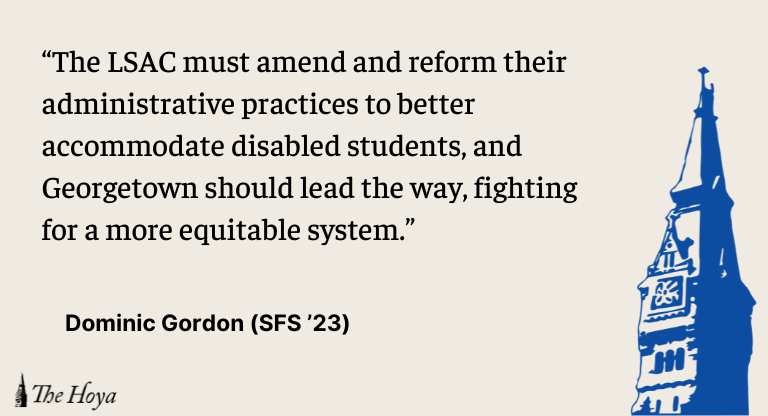The Law School Admission Council (LSAC), the group of law schools that runs the Law School Admission Test (LSAT), is in the midst of reforming its entrance exam. In 2019, a blind test-taker successfully sued the council over the impossibility of the Logic Games section for those that cannot see. This student’s struggle was not an isolated incident. Further, the proposed reforms, including a change to the format of the Logic Games section, are insufficient in addressing the breadth of the test’s accessibility challenges faced by disabled students.
The failure of organizations to properly handle the needs of people with disabilities, especially those that are not outwardly visible, is enabled by a society privileged enough to choose not to focus on them. This blind ignorance has impacted me in many facets of my life, but the one issue I am no longer willing to stay silent about is the administration of standardized tests. It is necessary for the LSAC to place more emphasis on disability training among administrators and to establish the proper procedures to strategically support disabled students looking to competitively apply to law school.
I am an autistic student with severe fine motor delay. Every word I write or type is incredibly painful. For those unfamiliar with the LSAT, the test is broken down into three sections: Logical Reasoning (“Arguments”), Analytical Reasoning (“Logic Games”), and Reading Comprehension. My disability makes many questions difficult for me, as the exam often requires drawing models to show logical proof.
For this reason, I was given a legal accommodation. I was supposed to be able to use unlimited scrap paper, as opposed to the maximum of five pages that most students receive. Despite this being clearly marked in my registration, I anticipated resistance and called the LSAC several times prior to my test to remind them of my accommodation. Nonetheless, on test day, administrators were not adequately informed.
I attempted to use the standard five pieces of paper, but quickly ran out of space. By the time I finished unsuccessfully asking my proctor to fulfill the accommodation I needed, half of my exam time had elapsed. In the end, I answered all of the questions and did well given the circumstances. However, it was not the score I know I could have achieved had I been treated with the respect and understanding I was owed.
Although I was offered a retest, I didn’t take it, as it would require the cancellation of my score with no guarantee that the same events wouldn’t reoccur. I simply wanted an explanation of my testing circumstances on my transcript for law schools to see. More importantly, I wanted recognition of the way law schools in this country have failed students by not carefully accounting for and supporting individuals with disabilities throughout the already challenging application process.
Like every law school, Georgetown is a member of the LSAC. I want them to advocate for students like me and to take accountability for the repeated transgressions against disabled students. Our suffering is so often neglected, and solutions can be created in many academic scenarios with a little time and effort.
Although disabled students like me experience instances of discrimination every day, the LSAC’s failure to uphold its legal obligation to provide accommodations has the capacity to limit our educational prospects, internship options and career trajectories. For a group that already struggles with low employment, these often unseen stigmas and inequities have direct life consequences.
Disabled voices often do not get the same platform that others do. However, discrimination impacts our lives just as much. It is easy to feel overlooked, isolated and unwelcome when your community, even the most vocal advocates, don’t seem interested in addressing marginalization.
This is not my first story of exam difficulties. Something must change, and it must begin with advocacy at the administrative level of upper education institutions. I want my school, which I love, to advocate for disabled persons and to clearly communicate violations of student’s accommodations when sending scores to schools.
The LSAC must amend and reform their administrative practices to better accommodate disabled students, and Georgetown should lead the way, fighting for a more equitable system.
Dominic Gordon is a graduate of the School of Foreign Service.














